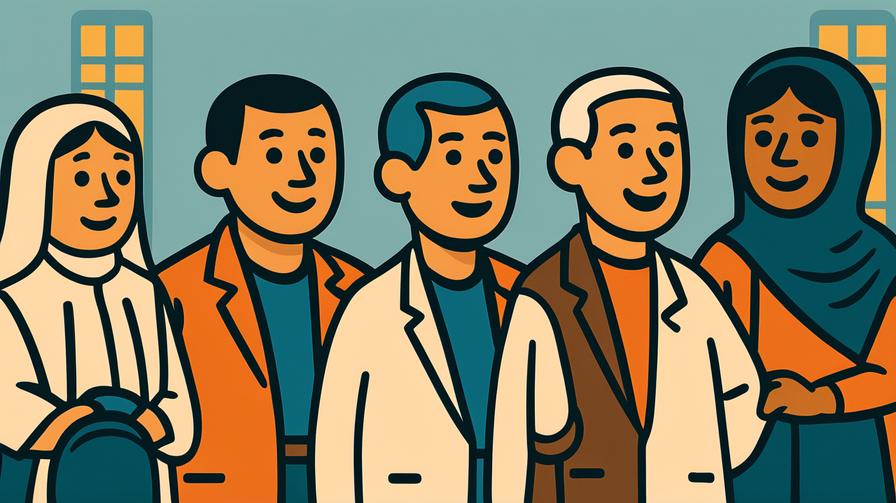[Disclaimer] This article is reconstructed based on information from external sources. Please verify the original source before referring to this content.
News Summary
The following content was published online. A translated summary is presented below. See the source for details.
Salesforce has released its Global AI Readiness Index, evaluating 16 countries on their preparedness for AI-driven transformation. The United States, Singapore, United Kingdom, Canada, and Germany emerged as leaders, demonstrating strong innovation ecosystems, capital investment, and widespread AI adoption. The index assessed five key dimensions: regulatory frameworks, AI diffusion and adoption, innovation ecosystems, investment environments, and human capital/skills. Countries like South Korea, Japan, Australia, France, and Saudi Arabia show growing momentum but need improvements in capital mobilization and workforce training. Meanwhile, Mexico, Indonesia, Brazil, and Argentina are making progress in AI strategy but lag in infrastructure, funding, and workforce readiness. The report emphasizes that public sector deployment and workforce upskilling are key differentiators for high-ranking countries. Salesforce’s Aliki Foinikopoulou notes that countries acting decisively to boost adoption, align strategies, and invest in skills will be best positioned to benefit from AI transformation, particularly as the world moves toward agentic AI systems.
Source: Salesforce News
Our Commentary
Background and Context

Think of the AI revolution like a global race where countries are competing to build the smartest, most advanced societies. Just as some countries excel at sports or education, Salesforce’s Global AI Readiness Index shows which nations are best prepared to harness artificial intelligence for their citizens and businesses.
This isn’t just about having the coolest technology—it’s about having all the pieces in place: good laws, trained workers, money for investment, and companies actually using AI. It’s like preparing for a marathon: you need not just running shoes, but also training, nutrition, a race plan, and the determination to finish.
Expert Analysis
Salesforce evaluated countries across five critical areas, each representing a crucial piece of the AI readiness puzzle:
Regulatory Frameworks: Like traffic laws for the internet, these are rules that keep AI safe and fair. Countries need smart policies that encourage innovation while protecting citizens from AI’s potential risks.
AI Diffusion & Adoption: This measures how widely AI is actually being used—not just in tech companies, but in hospitals, schools, stores, and government offices. The leaders aren’t just talking about AI; they’re using it everywhere.
Innovation Ecosystems: This looks at whether countries have the universities, research labs, and startup communities needed to create new AI technologies. It’s like having good soil for planting seeds of innovation.
Investment Environments: Money matters! Countries need investors willing to fund AI projects and businesses ready to spend on AI technology.
Human Capital & Skills: Perhaps most importantly, do people have the skills to work with AI? This includes everyone from programmers to teachers who use AI tools in classrooms.
Additional Data and Fact Reinforcement
The index revealed three distinct groups of countries:
Leaders (USA, Singapore, UK, Canada, Germany):
• Strong coordination between government and businesses
• Advanced digital infrastructure (fast internet, data centers)
• Active use of AI in both private companies and government services
Growing Momentum (South Korea, Japan, Australia, France, Saudi Arabia):
• Good progress in some areas, especially public services
• Need more investment money and worker training programs
Building Foundation (Mexico, Indonesia, Brazil, Argentina, Italy):
• Making strategic plans for AI
• Still need basic infrastructure, funding, and education programs
Related News
This index comes as countries worldwide are racing to establish themselves in the AI economy. The timing is crucial as we move toward “agentic AI“—AI systems that can take actions and make decisions more independently, like the Agentforce system Salesforce recently launched.
Major tech companies are investing billions in AI development, and governments are creating national AI strategies. The European Union has been leading in AI regulation with its AI Act, while the US focuses on innovation and China invests heavily in AI research. This competition is reshaping global economics, similar to how the internet revolution created new tech powerhouses in the 1990s and 2000s.
Summary

The Global AI Readiness Index shows that while some countries are sprinting ahead in the AI race, the gap isn’t insurmountable—most nations are converging toward readiness. The key differentiators aren’t just technology or money, but having coordinated strategies that bring together government policy, business innovation, and workforce development.
For students thinking about their futures, this index offers valuable insights. Countries investing in AI education and skills training will likely offer the best opportunities. The report suggests that success in the AI era requires more than just technical knowledge—it needs collaboration between educators, policymakers, business leaders, and workers willing to learn new skills. As AI becomes as fundamental to economies as electricity or the internet, countries that act decisively now will shape the future of work and innovation.
Public Reaction
Policy makers and business leaders have welcomed the index as a roadmap for AI development. Countries ranking lower are using it to identify specific areas for improvement. Education leaders particularly note the emphasis on workforce skills, with many calling for updated curricula to prepare students for AI-integrated careers. Some critics argue the index favors wealthy nations with existing tech infrastructure, though Salesforce maintains that the framework shows clear paths for advancement regardless of starting position.
Frequently Asked Questions
Q: Why does AI readiness matter for regular people?
A: Countries with better AI readiness will likely have more job opportunities, better public services (like healthcare and education), and stronger economies that benefit everyone.
Q: Can countries catch up if they’re behind?
A: Yes! The report shows that focused efforts on education, infrastructure, and smart policies can help countries advance quickly in AI readiness.
Q: What is “agentic AI” mentioned in the report?
A: It’s the next generation of AI that can take actions and make decisions more independently, like a smart assistant that doesn’t just answer questions but actually completes tasks for you.


